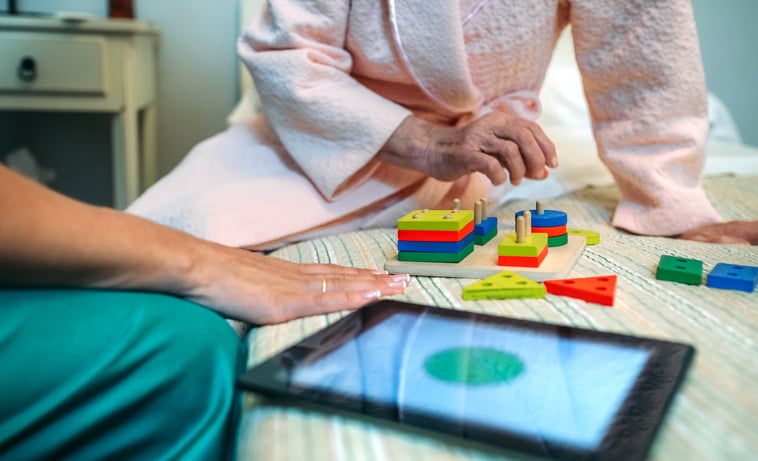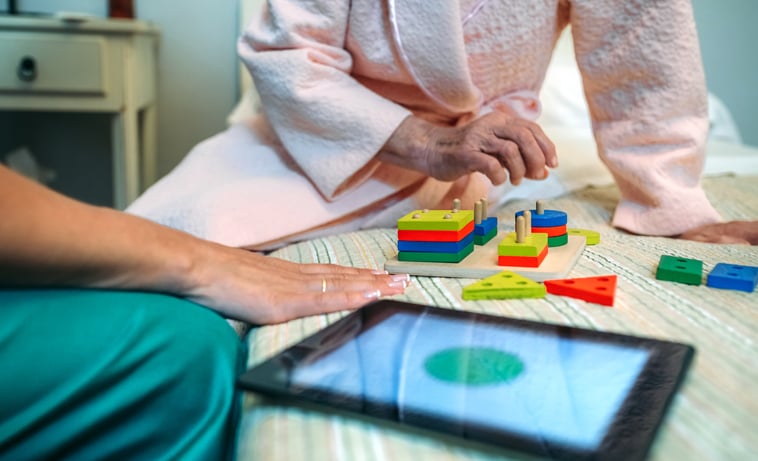 Alzheimer Disease (AD) is the most common type of dementia, accounting for at least 2/3 of the cases of dementia in people age 65 and older. AD is a neurodegenerative disease that causes progressive and disabling impairment of cognitive functions including memory, comprehension, language, attention, reasoning, and judgment.
Alzheimer Disease (AD) is the most common type of dementia, accounting for at least 2/3 of the cases of dementia in people age 65 and older. AD is a neurodegenerative disease that causes progressive and disabling impairment of cognitive functions including memory, comprehension, language, attention, reasoning, and judgment.
According to Johns Hopkins Medicine, there are over 6 million Americans living with AD with 3 million new cases diagnosed each year. This disease is deadlier than breast cancer and prostate cancer combined.
Often, early warning signs are dismissed or mistaken for normal aging behaviors such as forgetting or misplacing things. Early detection can help people maintain their independence longer and slow the progression of symptoms.
Ann Kriebel-Gasparro, a faculty member in Walden University's Master of Science in Nursing program emphasizes that Nurses who have training in dementia and AD with Gerontological patients can provide quality medical care to help track and manage symptoms.
Common warning signs/symptoms include:
- Memory loss that disrupts daily life
- Challenges in planning or solving problems
- Difficulty completing familiar tasks
- Confusion with time or place
- Trouble understanding visual images and spatial relationships
- New problems with words in speaking or writing
- Misplacing things and losing the ability to retrace steps
- Decreased or poor judgment
- Withdrawal from work or social activities
- Changes in mood and personality
To provide high quality care, it’s important to consider these best practices when treating patients with Alzheimer’s:
Communication
Do not assume a patient can not communicate or express their feelings on their own. Instead, try using these communication techniques:
- Maintain eye contact and direct one-on-one interaction.
- Be patient and offer assurance when the patient makes mistakes or feels embarrassment.
- Ask clear and simple questions requiring yes or no answers to minimize confusion.
- Do not interrupt or argue.
- Engage in conversations in quiet spaces without distractions.
Create a Daily Care Plan
Having a structured and predictable daily schedule is important for patients. It helps to reduce restlessness, anxiety, episodes of confusion and thought process impairment. This set routine helps them maintain a degree of autonomy in their activities of daily living.
Scheduled care plans usually include:
- Meal times
- Walking or gentle exercises
- Drawing or painting
- Reading books and magazines
- Watching favorite shows or movies
- Listening to music
Proper Hygiene
People with AD may struggle to maintain their personal hygiene. Some might simply forget they need to care for themselves, or, in later stages, forget how to do so.
Some considerations for assisting with personal care:
- Be flexible — adapt to the person’s preferences.
- Help the person be as independent as possible.
- Guide by using easy, step-by-step directions.
- Speak in short, simple sentences.
- Avoid rushing the person through a task.
- Encourage, reassure and offer praise.
- Watch for nonverbal communication.
- Experiment with new approaches.
- Consider using different products.
- Be patient, understanding and sensitive.
Pain Management
When working with people who have Alzheimer’s it's important to remember pain is a common symptom experienced by patients. It can be difficult to assess pain levels of a patient if they struggle with verbal communication.
There are different pain assessment and management tools, such as the Abbey Pain Scale or Pain Assessment in Advanced Dementia Scale (PAINAD) that can help you understand when nonverbal patients are experiencing pain.
These tools work best when you spend a lot of time with the same patients and have a baseline of what is normal behavior and comfort for them.
Fall Prevention
According to the CDC, more than 1 in 4 seniors fall each year. Having Alzheimer's can increase that risk because AD can impact balance and spatial reasoning.
Knowing that your patients are at greater risk is a crucial first step, but there is more you can do to prevent falls such as:
- Keeping rooms and walkways clear to prevent tripping or stumbling
- Supervising or providing a safety companion to help patients walk
- Keep patients occupied and entertained so they are less likely to wander or move around unnecessarily
- Promoting safe physical activity to improve balance and coordination
- Providing better lighting so patients can see better
- Offering assistive devices, such as a walker or handrails, when necessary
- Encouraging appropriate clothing and footwear
- Assessing medications, especially if they make patients feel dizzy
Wandering Prevention
According to the Alzheimer's Association, AD causes people to lose their ability to recognize familiar places and faces. It’s common for a person living with dementia to wander or become lost or confused about their location, and it can happen at any stage of the disease. Six in 10 people living with dementia will wander at least once; many do so repeatedly.
The following tips may help reduce the risk of wandering:
- Provide opportunities for the person to engage in structured, meaningful activities throughout the day
- Identify the time of day the person is most likely to wander (for those who experience “sundowning,” this may be starting in the early evening.) Plan things to do during this time — activities and exercise may help reduce anxiety, agitation and restlessness.
- Ensure all basic needs are met, including toileting, nutrition and hydration. Consider reducing – but not eliminating – liquids up to two hours before bedtime so the person doesn’t have to use and find the bathroom during the night.
- If the person is still safely able to drive, consider using a GPS device to help if they get lost.
- If the person is no longer driving, remove access to car keys — a person living with dementia may not just wander by foot. The person may forget that he or she can no longer drive.
- Place deadbolts out of the line of sight, either high or low, on exterior doors. (Do not leave a person living with dementia unsupervised in new or changed surroundings, and never lock a person in at home.)
- Use night lights throughout the home.
- Install warning bells above doors or use a monitoring device that signals when a door is opened.
- Place a pressure-sensitive mat in front of the door or at the person's bedside to alert you to movement.
- Label all doors with signs or symbols to explain the purpose of each room.
- Store items that may trigger a person’s instinct to leave, such as coats, hats, pocketbooks, keys and wallets.
- Consider enrolling the person living with dementia in a wandering response service.
- Ask neighbors, friends and family to call if they see the person wandering, lost or dressed inappropriately.
- Keep a recent, close-up photo of the person on hand to give to police, should the need arise.
Final Stages of Care
Nursing care for Alzheimer's patients becomes especially critical during the final stages. Skilled Nurses with extensive AD knowledge not only provide treatment to patients but also help families prepare for end-of-life decisions. They also provide emotional support to family members and provide suggestions for preparing for the final stages.
Click Here For Alzheimer's and Related Dementia Resources for Professionals






